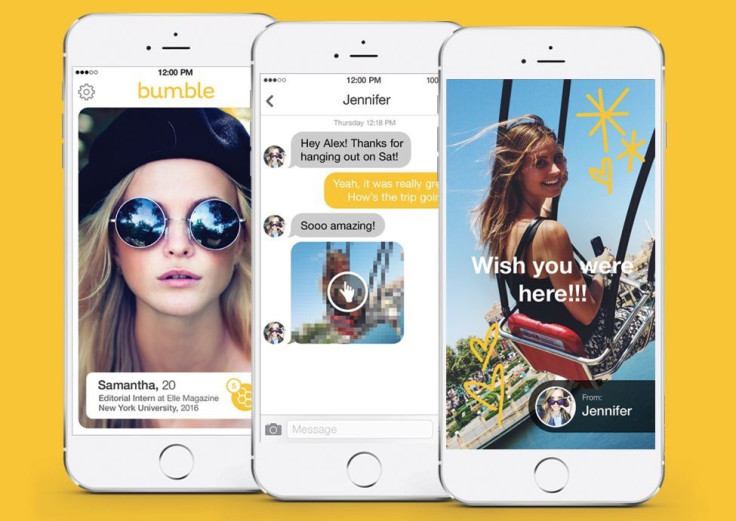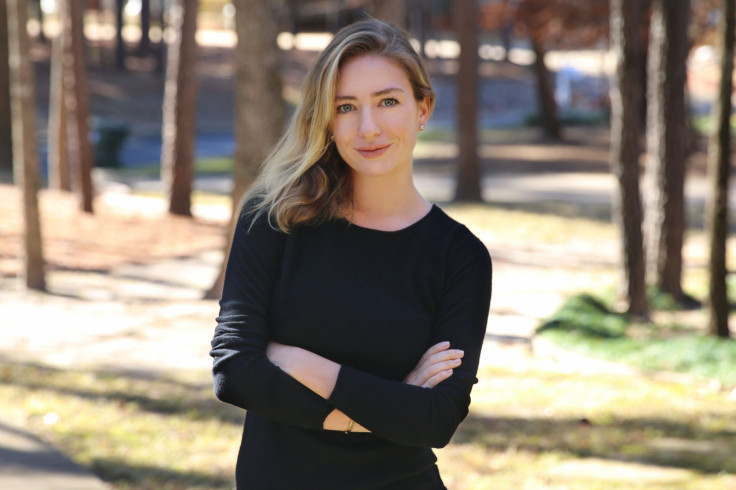Bumble: The Feminist Tinder? Women Reach Out First Within 24 Hours

Ever since dating app Tinder came onto the scene, a number of apps have emulated its quick 'n' dirty "swipe left for no, right for yes" formula. But Bumble, created by Tinder alum Whitney Wolfe that launched in December, does something no other app does: It makes it ladies' night, every night, and women must make the first move. Only women can reach out to their matches -- and they have only 24 hours to do so.
Bumble provides an elegant solution to a problem many complained about on Tinder: Neither men nor women want to be the first to write, "What's up?"
Wolfe might know a thing or two about male power, dating and Tinder. She was one of the first employees at Tinder, working as a marketing executive, whose task, as a Businessweek profile reported, was to get young, straight women interested in what is largely seen as a "hook up" app. She and her direct supervisor -- and then Tinder CEO -- Justin Mateen got romantically involved, and it went south in a big way.
She ultimately filed a lawsuit in June 2014 against Tinder and IAC, its parent company, for sexual harassment, discrimination and defamation, among other complaints, alleging she was essentially forced to quit. (Mateen, it's alleged, called her a “whore” and didn't want Wolfe listed as a founder because it would look “slutty” for a woman to play a part in a founding a hookup app, according to a Reuters report.) It was settled out of court in September, Wolfe told IBTimes, with no admission of wrongdoing.
Wolfe has taken her insights on women and dating and brought them to Bumble. One of her inspirations was the idea of the Sadie Hawkins dance, the idea popularized in the 1930s by a L'il Abner comic strip, in which women ask men to dance rather than the other way around.
"What’s interesting about the Sadie Hawkins dance," said Wolfe, recounting dances in high school, " is that when it was girls asking, me and my girlfriends were so confident. We felt empowered rather than sitting around waiting for someone to ask us, which is a daunting feeling."
If men and women are supposed to be equal, she asks, "Why do we need to sit back and wait for these guys to pick and choose? With the Sadie Hawkins dance, it’s interesting how you’re forcing the woman to have confidence and moxie." She also says Bumble's requirement that women make the first move takes the pressure off men, and "He feels flattered."
Although Wolfe couldn't disclose how many people have joined Bumble since it launched in December, she said it was in the "hundreds of thousands, and growing 15 perecent week-over-week." Around 55 percent of Bumble users are women, around 60 percent are 18 - 25, and most others are 25 - 35. "We have a lot of Ivy League college kids and college kids in general," she said, and rather than a pile up of matches with no conversation, according to Wolfe, 60 percent of matches are turning into conversations.

Although Bumble might not feed "men's need for instant gratification," as one writer described Tinder, and they can't reach out first, they can do a little more than sit around waiting to be asked to dance, so to speak. There's a little feature Wolfe described that allows a man to extend one match a day up to 48 hours -- to hint, basically, that he wants to be chosen, and the woman will receive a notification. "This man has chosen to extend his time on you and only you," Wolfe said. "Therefore, it's a very big compliment. He's not dishing out roses to every girl in the queue. He's choosing you."
Although most people would find the idea that only men should ask women out old-fashioned, the idea persists. “What’s fascinating is that on traditional platforms or real life, the woman who makes the first move sometimes men will perceive it as a bit too forward or desperate,” said Wolfe,” adding that “the beauty” of Bumble is that the platform emboldens women to make the first move, but it also gives them an excuse. “We’re modern,” she said, “but we’re not quite there yet. These unwritten rules will take a minute to penetrate through society. So blame Bumble!”
Bumble is also queer-friendly, and only the 24-hour rule applies to gay women and men. When asked if Bumble could be seen as a feminist dating app, Wolfe said yes, but with qualifications.
"Feminism is a term that's misunderstood," she said. "It's equality. Equal rights for men and women. If you're asking if we're striving for equality, absolutely. Are we trying to make it feminist, yeah, sure. I think millennials don't understood fully the definition, it can be a daunting term for people. We've seen guys say, ugh, Bumble's feminist. And I want to say, do you have a mother? Do you believe in equal rights? I'm glad it's feminist. It's a feminist platform. We're not trying to put women before men. It's not a superiority app. It's just simply trying to level the playing field in terms of equality for women and men."
© Copyright IBTimes 2025. All rights reserved.






















